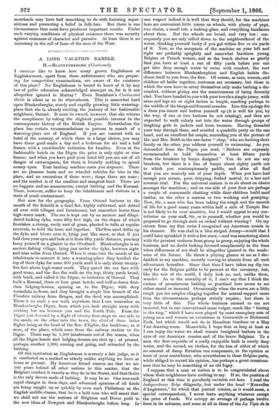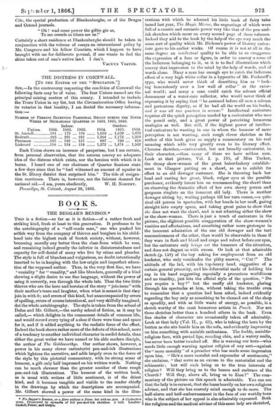1 SHOULD like to know how many grown Englishmen or
Englishwomen, apart from those unfortunates who are prepar- ing for competitive examinations, are aware of the existence of this place ? No Englishman is bound to know of it by any law of polite education acknowledged amongst us, for is it not altogether ignored in Murray ? Even Bradshaw's Continental Guide is silent as to its whereabouts. This is somewhat hard upon Blankenberghe, sturdy and rapidly growing little watering- place that she is, already exciting the jealousy of her fashionable neighbour, Ostend. It must be owned, however, that she returns the compliment by taking the slightest possible interest in the contemporary history of the British Empire. Nevertheless the place has certain recommendations to persons in search of a watering-place out of England. If you are content with an hotel of the country, of which there is a large choice, you may have three good meals a day and a bedroom for six and a half francs, with a considerable reduction for families. Even at the fashionable hotels on the Digue the price is only eight or nine francs ; and when you have paid your hotel bill you are out of all danger of extravagance, for there is literally nothing to spend money upon. Your bathing machine costs you sixpence. There are no pleasure boats and no wheeled vehicles for hire in the place, and no excursions if there were ; shops there are none ; and the market is of the smallest and meagrest kind. There are no beggars and no amusements, except bathing and the Kursaal. These, however, suffice to keep the inhabitants and visitors in a state of much contentment.
But now for the geography. From Ostend harbour to the mouth of the Scheldt is a dead flat, highly cultivated, and dotted all over with villages and farmhouses, but somewhat lower than high-water mark. The sea is kept out by an ancient and dilapi- dated-looking dyke, some fifty feet high, on the slopes of which flourishes a strong, reedy sort of grass, planted in tufts at regular intervals, to hold the loose soil together. The-fine sand drifts up the dyke and blows over it, lying just like snow, so that if you half close your eyes and look at it from fifty yards' distance, you may fancy yourself on a glacier in the Oberland. Blankenberghe is an ancient fishing village, lying just under the dyke, between eight and nine miles from Ostend. When it came into the minds of the inhabitants to convert it into a watering-place they levelled the top of their dyke for some 600 yards until it is only about twenty- five feet above high-water mark. They paved the sea face with good stone, and the fine flat walk on the top, thirty yards broad, with brick, and called it the Digue, in imitation of Ostend. They built a Kursaal, three or four great hotels, and half-a-dozen first- class lodging-houses, opening on to the Digue, with deep verandahs in front, and they brought a single line branch of the Flanders railway from Bruges, and the deed was accomplished. There is no such a sea walk anywhere that I can remember as Blankenberghe Digue, from which you look straight away with nothing but sea between you and the North Pole. From the Digue you descend by a flight of twenty-four steps on one side to the sands, on the other into the town, the chief of these latter flights being at the head of the Rue d'Eglise, the backbone, as it were, of the place, which runs from the railway station to the Digue. There may be 1,500 inhabitants out of the season, when all the Digue hotels and lodging-houses are shut up ; at present, perhaps, another 1,000, coming and going, and attracted by the bathing.
Of this institution an Englishman is scarcely a fair judge, as it is conducted on a method so utterly unlike anything we have at home at present. My American friend assures me that we are 100 years behind all other nations in this matter, that the Belgians conduct it exactly as they do in the States, and that theirs is the only decent mode of bathing. It may be so. One sees such rapid changes in these days, and advanced opinions of all kinds are being caught up so quickly by even such Philistines as the English middle classes, that he is a bold man who will assert that we shall not see the notions of Brighton and Dover yield to the new ideas of Newport and Blankenberghe before long. In one respect indeed it is well that they should, for the machines here are convenient little rooms on wheels, with plenty of pegs, two chairs, a small tub, a looking-glass, and everything handsome about them. But the wheels are broad, and very low ; con- sequently you are only rolled down to the neighbourhood of the water, thinking yourself lucky if you get within five or six yards of it. Now, as the occupants of the machine on your left and right are probably sprightly and somewhat facetious young Belgian or French women, and as the beach shelves so gently that you have at least a run of fifty yards before you can get into deep enough water to swim with comfort, the root difference between Blankenberghian and English habits dis- closes itself to you from the first. Of course, as men, women, and children all bathe together, costumes are necessary, but those in which the men have to array themselves only make bathing a dis- comfort, without giving one the consciousness of being decently clad. You have handed to you with your towels a simple jersey, with arms and legs six or eight inches in length, reaching perhaps to the middle of the biceps and femoral muscles. Into this apology for a dress you insert and button yourself up (it is well for you, by the way, if one or two buttons be not missing), and then are expected to walk calmly out into the water through groups of laughing girls in jackets and loose trousers. Having threaded your way through these, and avoided a quadrille party on the one hand, and an excellent fat couple, reminding you of the picture of Mr. and Mrs. Bubb in the one-horse " chay," who are bathing their family on the other, you address yourself to swimming. As you descended from the Digue you read, " Bathers are expressly recommended to hold themselves at least fifteen yards from the breakers by buoys designed." You do not see any breakers, but there is a line of buoys about eighty yards out to which you contemptuously paddle, and after all find that you are scarcely out of your depth. When you have had enough you return, poor, dripping, forked mortal, to a last and severest trial. For the universal custom is to sit about on chairs amongst the machines ; and on one side of your door are perhaps a couple of nursemaids chatting while their children build sand castles, on the other a matron or two working and gossiping. Now, Sir, a man who has been taking the rough and the smooth of life for a good many years within half a mile of Temple Bar is not likely to be over sensitive, but I would appeal to any con- tributor on your staff, Sir, or to yourself, whether you would be prepared to go through such an ordeal without wincing? On my return from my first swim I recognized my American cousin in his element. He was clad in a blue striped Jersey—would that I could have sprinkled it with a few stars,—and was sauntering about with the greatest coolness from group to group, enjoying the whole business, and no doubt looking forward complacently to the time when differences of sex shall be altogether ignored in the acade- mies of the future. He threw a pitying glance at me as I ske- daddled to my machine, secretly vowing to abstain from all such adventures hereafter. Since that time I have taken my dip too early for the Belgian public to be present at the ceremony, but, like the rest of the world, I daily look on, and, unlike them, wonder. As to the morality of it, I can't say that I think the custom of promiscuous bathing as practised here seems to me either moral or immoral. Occasionally when the waves are a little rough you see couples clinging together for mutual support more than the circumstances perhaps strictly require ; but there is very little of this. The whole business seemed to me not immoral, but in our conventional sense vulgar, much like " kissing in the ring," which I have seen played by most exemplary sets of young men and women on excursions in Greenwich or Richmond Park, but which would not do in Hamilton Gardens or a May Fair drawing-room. Meanwhile, I hope that as long at least as I can enjoy the water we shall remain benighted bathers in the eyes of our American cousins and of the brave Belgians. To a man the first requisite of a really enjoyable bath is surely deep water, and the second, no clothes, for the loss of either of which no amount of damp flirtation can compensate, in the opinion at least of your contributor, who nevertheless in these Belgian parts, while obliged to record his opinion, has perhaps a great conscious- ness that he may be something of an old fogey.
I suppose that a man or nation is to be congratulated about whom their neighbours have nothing to say. If so, the position of England at this time is peculiarly enviable out here. I read the Independance Belge diligently, but under the head "Nouvelles d'Angleterre," for which that journal retains, as it would seem, a special correspondent, I never learn anything whatever except the price of funds. We occupy an average of perhaps twelve lines in its columns, and none at all in those of the La Vigie dfbla Cote, the special production of Blankenberghe, or of the Bruges and Ostend journals.
" Oh ! wad some power the giftie gie us, To see oursels as ithers see us !"
Certainly a short residence at Blankenberghe should be taken in conjunction with the volume of essays on international policy by Mr. Congreve and his fellow Comtists, which I happen to have brought with me for deliberate perusal, if one wants to feel the shine taken out of one's native land. I don't.
VACUUS VIATOR.































 Previous page
Previous page